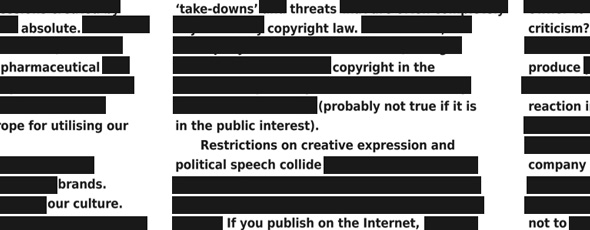
Intellectual Property laws are immensely controversial in their effects, which range from everyday restriction of free expression through abuse of copyright, to the abuse of patent law, rigged mobile phone markets and the denial of medicines to people in the majority world.
The term Intellectual Property was deliberately chosen and promoted by lobbyists to portray trademarks, copyrights and patents as a kind of inalienable property: to make people feel that the control over ideas and expressions created by these laws is both natural and absolute. The term is now written into international law, a tribute to the power of publishing, pharmaceutical and chemical industry lobby groups, and their vision of the global south being forced to pay long term rent to the US and Europe for utilising our intellectual creations.
Trademarks and copyright are used to protect internationally recognisable brands. They also control iconic aspects of our culture. Whether a pop song like Thriller, or franchises like Star Wars, important shared references in our collective experience are commercially controlled and restricted. There is an obvious tension between restrictions on publication and our free expression. While copyright and trademark laws are meant to avoid these problems, by allowing ‘exceptions’ with regard to comment and news reporting for instance, these do not work as well as they should. There are deep problems with two broad areas of copyright.
Firstly, artists can find that innovative use of ‘copy and paste’ culture is restricted by copyright. In music, copyright has been used to restrict tiny two second long samples. Artists like Danger Mouse or Girl Talk have built careers on copyright infringing mash ups, but few are willing to take commercial risks. Even individuals can be caught, as happened to one mum whose video of her baby dancing to a Prince song was pulled for infringing copyright. The Electronic Frontier Foundation in the USA are still fighting this case.
At the very least, these losses are a kind of digital cultural tragedy, where the power of expression given to us by the immensely powerful tools of digital creativity is dissipated by copyright law.
The second kind of restriction on free expression created by copyright comes through ‘take-downs’ and threats that are often completely unjustified by copyright law. For instance, if a company’s documents are leaked, it might be claimed that there is copyright in the documents (probably true) which means they cannot be distributed (probably not true if it is in the public interest).
Restrictions on creative expression and political speech collide in the field of parodies. Creating a parody or pastiche of a film, song or book is extremely likely to infringe copyright in the UK. If you publish on the Internet, perhaps on Youtube, the result is that you are very likely to have your video or song taken down at the request of the person you are trying to make fun of. I am writing, of course, in the Occupied Times, itself a parody that may be open to claims of copyright infringement.
Parodies are extremely powerful: they turn the experience of the original work against itself, and question the ideas and values of whatever is being parodied. Parodies are perhaps a vital tool in a world of brands, in that they use the recognition people have of that brand to communicate what it is wrong with the company or culture behind the brand. For example, Greenpeace ran a Star Wars parody on Youtube, criticising Volkswagen’s original Darth Vader advert. This was a response to Volkswagen’s lobbying against climate change legislation, and it turned the good and evil meme against the company. Lucasfilm (responsible for the Star Wars franchise) demanded that the video be withdrawn. The battle benefited Greenpeace in that they gained publicity for their campaign, but they lost some of the momentum behind the spread of the video at a critical time. Unlike many who attempt to subvert brands in this way, Greenpeace has the organisational power to stand up to big business.
We need to ask: is it right for a copyright owner to be able to use copyright law to restrict criticism? Some people will simply decide not to take the risk of court action and so will not produce parodies, while others will withdraw them when threatened. We saw this kind of reaction in the UK a couple of years ago when the Radical Media Conference (RMC) was threatened with trademark infringement by an advertising company who had speculatively trademarked the name, in case they decided to run marketing conferences using it. The RMC in that case chose not to take the risk and renamed themselves the Rebellious Media Conference.
In summer 2012, the Olympic organising committee used copyright to suppress a video by Mothers’ Best Child. The video featured Olympic mascots Wenlock and Mandeville joining a riot, in order to highlight the contrast between austerity and the huge expense of the games. It was a straightforward parody, and would have been defensible under US or French copyright law, but was deemed to infringe copyright in the UK.
There are many other extreme examples of copyright being abused to restrict free speech. In the UK we are in an especially weak position, with particularly restrictive copyright laws. These laws need dragging into a digital age which has huge potential for networking and spreading ideas – but which is currently being unduly restricted.
Copyright may be a good thing, that can protect artists, but it is also open to abuse, which we need to be vigilant against. Given the huge commercial interests involved, resisting vested interests is a difficult task, but the last ten years have created several movements looking for change. From the Open Rights Group to academia, libraries, official government reviews, ‘pirate parties’ and Anonymous, there are a growing number of voices asking for fairer laws.
By Jim Killock (@jimkillock)









